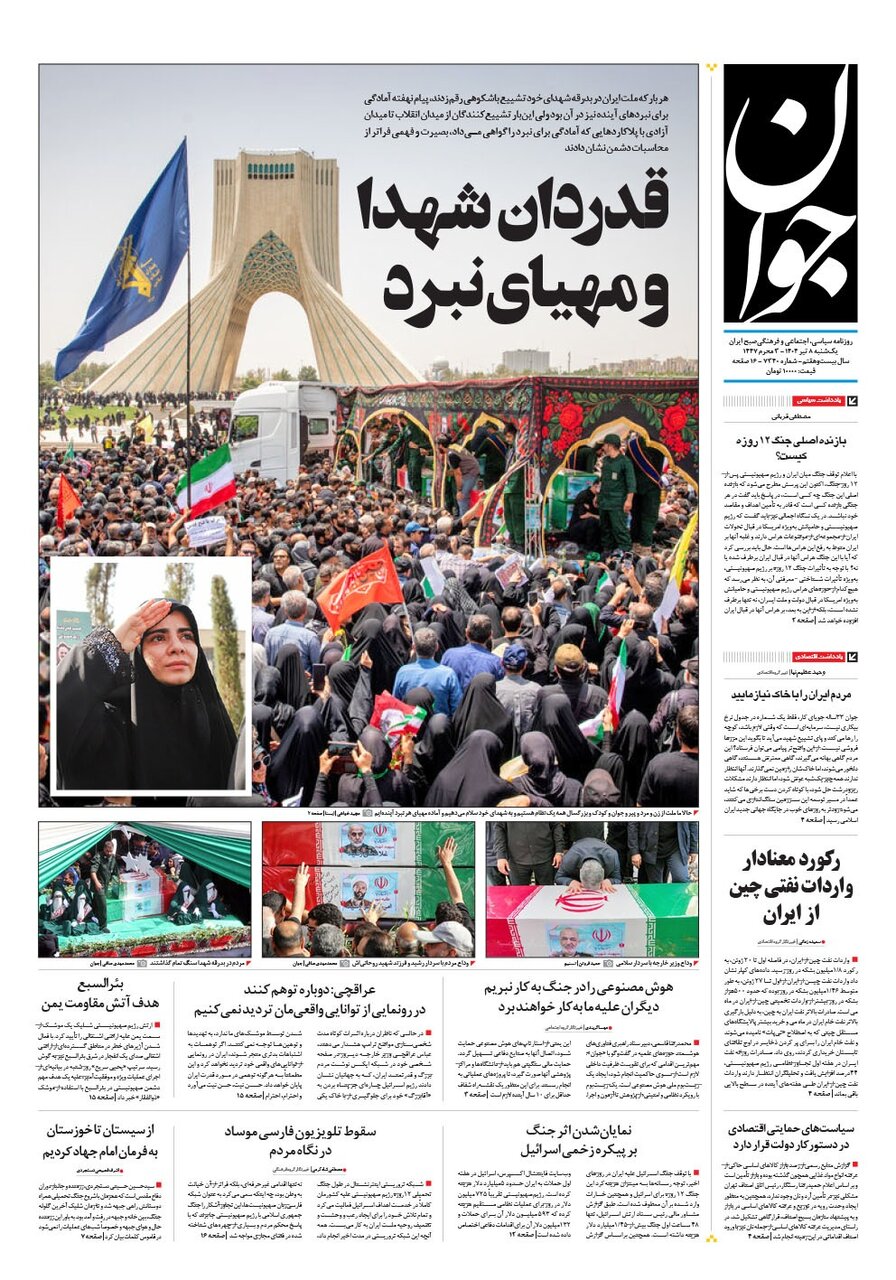"The defeat" was product of aggression against Iran

TEHRAN - In an analysis, Javan discussed the defeat of Israel and the United States in the 12-day war against Iran and wrote: The terrorist Zionist regime thought it could achieve a decisive victory with the assassination of some Iranian military commanders.
But it found itself in a critical situation from which it would not be possible to escape so easily. As the United States clearly stated, the goal of the joint operation with the Zionist regime was to force Iran to surrender, a goal that Iran repelled by successfully launching missiles at Israel. Fearing destruction of its political and social fabric, Tel Aviv was forced to stop the war with Iran. In addition to the political and military defeat, the American-Zionist front is experiencing a defeat in public opinion. The Zionist regime's attacks on Iran have fueled the world's aversion of Tel Aviv. This is while the U.S. had been trying for years to present Iran as a violator of human values and rights through false propaganda campaigns.
Hamshahri: A costly miscalculation
Hamshahri examined Israel's mistakes and why it stopped the war with Iran that it triggered on June 13. It wrote: With the powerful response of the Iranian armed forces, the dream of a lightning battle that had been engineered by the Israeli generals quickly faded, and the terrorist aggressors became extremely concerned about the way the war was heading. The Israeli regime's reliance on the capability of its air force eroded as the war lengthened. The next very important point was the inability of the Israeli air defense system, known as Iron Dome, to protect Israel against the advanced Iranian missiles and drones, which caused heavy damage in Tel Aviv and Haifa. In such circumstances, and by putting these points together, it seems that Netanyahu, to find a way out of this predicament, and despite his aggressive nature, was forced to agree to a halt to the war. Given the nature and course of Israel's aggression, one must be vigilant and careful about the enemy's overt and covert movements, because the current situation is fragile, according to many analysts.
Vatan-e-Emrooz: The failure of IMEC corridor
In a commentary, Vatan-e-Emrooz said Iran is challenging the West’s macro-economic plans in the region as Israel started a war against Iran . It wrote: Iran’s missile and drone attacks on Haifa port, the largest commercial hub of the Zionist regime, marked a turning point in the geopolitical and economic equations of the region. This port, which was supposed to serve as a highway connecting India to Europe within the framework of the strategic Arab-Mediterranean Corridor (IMEC) project, has now become one of the riskiest areas in the eastern Mediterranean. These missile and drone attacks are considered part of Tehran’s decisive responses to the Zionist regime’s repeated attacks. The main goal is not merely physical destruction, but also disrupting the regime’s security-economic structure, which is heavily dependent on Haifa port. Recent developments show that geopolitical security is a fundamental element in the success of transit projects. Iran's attacks on Haifa were not just a military response to Israeli aggression, but a strategic move. It was able to challenge one of the most important economic and geopolitical projects of the Western-Hebrew-Arab axis.
Ettelaat: Israel is seeking another misadventure
In an interview with Seyyed Jalal Sadatian, an international affairs analyst, Ettelaat pointed to the shaky ceasefire between Iran and Israel. He said: A ceasefire or halt of war does not mean peace, and I think it is fragile. Israel is looking to carry out further assassinations. Israel is also making efforts to identify the location of the nuclear fuel that we had removed from Fordow. Looking at the way Israel behaved toward Lebanon, we can conclude that the second phase of assassinations is probably on the way. So, we must be vigilant so that we do not take off-guard again. Both in military and offensive-defensive areas, as well as diplomacy and narratives, we must be able to maintain our authority in a possible new confrontation with the enemy. This halt of war is not a ceasefire that Israel can easily accept despite its sense of defeat. In fact, Israel is looking for the first opportunity to make up for its losses because its plans have been disrupted. So, we must strengthen ourselves so that our vulnerability will be reduced as much as possible.
Leave a Comment